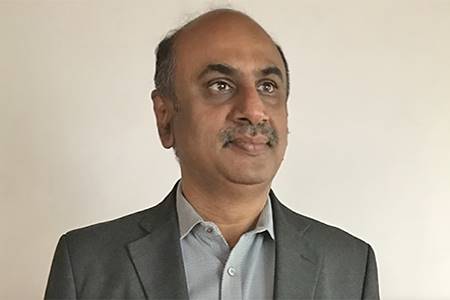Srihari Balakrishnan: We provided free food and shelter for workers during the pandemic

The managing director of denim producer KG Fabriks believes upskilled workers can be India’s biggest asset, as the country aims to be a global source of skilled manpower by 2022. The company invests heavily in employee training, as well as in sustainability and water-saving initiatives, to help meet the goals of the Textile Sector Skill Council.
What makes India stand out as a denim producing region and how have things changed over recent years?
With an installed capacity of around 1.7 billion metres per year, India is among the largest producers of denim fabrics, specialising in cotton-predominant varieties, by virtue of its strength as the world's biggest cotton-producing country. Indian manufacturers have the capability to make versatile ranges of denims, and have invested more on R&D in design and finishes recently. The State of Tamil Nadu is a front-runner in terms of sustainable denim production by using green energy from wind and solar, putting in place zero liquid discharge and zero solid discharge mechanisms, conserving water and paving the way for the circular economy by using post-consumer waste in production.
Can you tell us about KG Fabriks' social strategy, and how this was affected by the pandemic?
From April to June 2020, when the impact of covid was severe, we had 2,000 of our employees in our seven locations who are from other states of India. We provided free food and shelter for all of them. Temperature checks, yoga and wellbeing classes were held every day and are still in place. Doctors are stationed in all locations and each member of this large KG Fabriks family still follow social distancing, wear masks and follow other hygiene practices.
We run Indian government-approved technical training institutes in all our manufacturing locations, which helps our workforce to learn while they earn and achieve qualifications and certificates. We offer short courses and two- or three-year courses in all our locations with workers receiving certificates, diplomas or degrees at the end. Out of our 3,000-plus employees, around 2,500 have enrolled on a course. Also, more than 250 migrant families from poor rural areas have been resettled by us, with their children studying in schools with good infrastructural facilities.
What is India’s Textile Sector Skill Council doing to help people into employment?
India aims to be the global source of skilled manpower by 2022, with 65% of its population in the employable age, that is, below 35. If skilled and made employable, this can be the country’s biggest asset. The Government of India set up a scheme in 2015 through the National Skill Development Mission to train 400 million Indians by 2022 and make them employment ready. To achieve this, a robust skill ecosystem needs to be developed that has protocols for training providers and assessment agencies, sufficient numbers of academies for training and well-equipped centres.
The Textile Sector Skill Council (TSC) has worked to make this dream come true for the textile manufacturing industries in weaving, spinning, knitting, processing and handloom. TSC is also focusing on Recognition of Prior Learning (RPL) of candidates who have acquired the skills informally and has also created opportunities for improving their skills, career progression and employability. TSC assists mills in establishing training centres; implements skill development plans and offers career guidance; benchmarks the industry with international standards and identifies technologies that can be used for teaching and training.
How has the pandemic affected business?
Business trips and physical meetings have reduced drastically and it may continue to be the same in early 2021. This will result in companies depending on digital technologies to the maximum possible extent. We have digitised our 7,000+ qualities and curated them into a website for buyers to view.
What underpins your sustainability strategy and what do you offer?
Our concept is based on sustainability of earth, of time, of cost and of people. KGF Prime is one of our solutions to cut the production lead time by shipping goods the next day, and we have 41 denim fabrics in both shirt and bottom weights in this service. Our in-house developed mobile apps also speed up the response and sampling time to our customers.
We market our sustainability fabrics under three brand names: Green Dnm, Product Zero and Nature’s Blue, built on our two sustainability platforms, GreenCo Gold from Confederation of Indian Industries and Green Product Certification from TUV NORD, which means both the fabrics and production are sustainable. Green Dnm uses resources to the minimal possible extent in fabric processing. Product Zero is built on the Green Dnm platform and uses post-consumer waste and is laser friendly. Nature's Blue is our most sustainable denim, which is coloured with plant-based dyes and was developed in a collaboration between KG Fabriks, India’s Ministry of Textiles and the South India Textile Research Association.
What challenges have you faced and what are you most proud of?
Water conservation was the most challenging factor for us. Our in-house team has developed technologies such as iWash and iTop, which means we can make a metre of denim with only six litres of water. We estimate this saves around 2.5 million litres per day. We won the top prize in the SME category at the National Water Awards 2018 and received an Excellence in Water Management award in 2019. Today, we have achieved a 30% lower chemical footprint, 90% lower water footprint, 25% lower energy footprint and use 70% less in packing material compared with only a few years ago.
We are also one of the signatories to Ellen Macarthur Foundation's Jean Redesign project, whose guidelines are based on the principles of circular economy. We have more than 500 products in our range conforming to their standards and are starting to supply to brands. We offer post-consumer waste (PCW) polyester denims as well as PCW cotton denims, including our “landfill yarns”, which are 60% PCW polyester and 40% PCW cotton.
Srihari Balakrishnan is the managing director of KG Fabriks, which is part of Sri Kannapiran Mills Group, and is based in Coimbatore, India. Mr Balakrishnan has more than three decades of experience in denim making. He is a member of the Federation of Indian Chamber of Commerce and Industry and on the board of India’s Textile Sector Skill Council, which aims to improve skills and create jobs.













